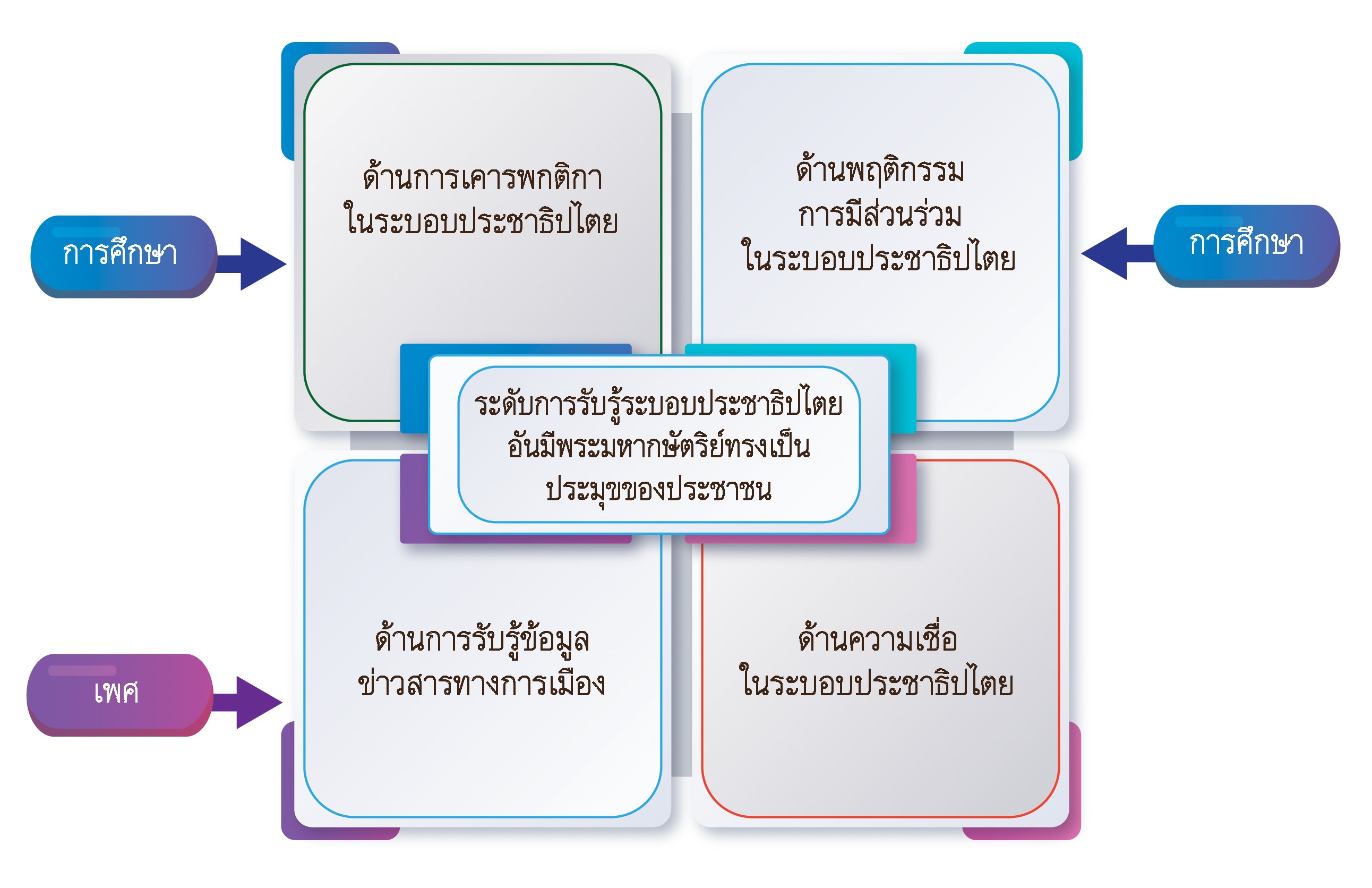Perception of Democratic Regime with the King as Head of State among the People in the Bangkok Metropolitan and Suburban Area
Main Article Content
Abstract
The purposes of this research were 1) investigate the level of perception of democracy regime with the King as Head of State among the people in the Bangkok metropolitan and suburban area, 2) compare the level of perception of democracy regime with the King as Head of State of the people in the Bangkok metropolitan and suburban Area, classified by gender and educational level. The people living in the Bangkok metropolitan and suburban area were randomly sampled. The sample size was determined according to Taro Yamane's method, the sample size was 1,134 people. The research instrument was a questionnaire with a reliability of 0.90. The data were analyzed by using percentages, averages, and standard deviations. Two-group independent t-test (independent t-test) and one-way analysis of variance (F-test) and post-hoc tests were performed to determine if there were any pairs that differed by testing for differences in means per pair using Fisher's least significant difference (LSD) method.
Results were as follows:
1. The level of perception of democracy regime with the King as Head of State among the people in the Bangkok metropolitan and suburban area was overall high, both in general and in specific aspects.
2. The results of the comparative analysis of the level of perception of democracy regime with the King as Head of State of the people in the Bangkok metropolitan and suburban area classified by gender indicate no differences. As for each aspect, it was found that the people had respect for the rules of democracy. The behavior of participation and belief in democracy were not different. As for the perception of political information between males and females, there were statistically significant differences at a significance level of 0.05. and when classified by educational level had significant differences at a level of 0.05. Upon consideration of each aspect, it was found that there are specific the people had respect for the rules of democracy and the behavior of participation shows significant differences at a level of 0.05.
Article Details

This work is licensed under a Creative Commons Attribution-NonCommercial-NoDerivatives 4.0 International License.
เพื่อให้เป็นไปตามกฎหมายลิขสิทธิ์ ผู้นิพนธ์ทุกท่านต้องลงลายมือชื่อในแบบฟอร์มใบมอบลิขสิทธิ์บทความ ให้แก่วารสารฯ พร้อมกับบทความต้นฉบับที่ได้แก้ไขครั้งสุดท้าย นอกจากนี้ ผู้นิพนธ์ทุกท่านต้องยืนยันว่าบทความ ต้นฉบับที่ส่งมาตีพิมพ์นั้น ได้ส่งมาตีพิมพ์เฉพาะในวารสาร วิชาการธรรม ทรรศน์ เพียงแห่งเดียวเท่านั้น หากมีการใช้ ภาพหรือตารางของผู้นิพนธ์อื่นที่ปรากฏในสิ่งตีพิมพ์อื่นมาแล้ว ผู้นิพนธ์ต้องขออนุญาตเจ้าของลิขสิทธิ์ก่อน พร้อมทั้ง แสดงหนังสือที่ได้รับการยินยอมต่อบรรณาธิการ ก่อนที่บทความจะได้รับการตีพิมพ์References
ฐะปะนีย์ นาครทรรพ และคณะ. (2546). หนังสือเรียนช่วงชั้นที่ 3 ภาษาไทย ม.1. นนทบุรี: ไทยร่มเกล้า.
ถวิล บุรีกุล, สติธร ธนานิธิโชติ และรัชวดี แสงมหะหมัด. (2562). รายงานการประเมินสถานการณ์ความเป็นประชาธิปไตยของประเทศไทย พ.ศ. 2562. กรุงเทพฯ: สำนักวิจัยและพัฒนา สถาบันพระปกเกล้า.
บุญชม ศรีสะอาด. (2546). การพัฒนาหลักสูตรและการวิจัยเกี่ยวกับหลักสูตร. กรุงเทพฯ: สุวีริยาสาส์น.
ปฏิพัทธ์ เชรศรี และไชยวัฒน์ เผือกคง. (2565). พฤติกรรมการรับรู้ข่าวสารทางการเมืองของผู้บริโภคสื่อสังคมออนไลน์ในจังหวัดสุราษฎร์ธานี. วารสาร มจร.หริภุญชัยปริทรรศน์, 6(2), 174-188.
พระปลัดคณิศร ขนฺติพโล, อนุภูมิ โซวเกษม และยุทธนา ปราณีต. (2564). การมีส่วนร่วมทางการเมืองในระบอบประชาธิปไตยของประชาชนในเขตบางกอกใหญ่ กรุงเทพมหานคร. วารสาร มจร. การพัฒนาสังคม, 6(2), 66-76.
ล้วน สายยศ และอังคณา สายยศ. (2543). เทคนิคการวิจัยทางการศึกษา. (พิมพ์ครั้งที่ 3). กรุงเทพฯ: สุวีริยาสาส์น.
วชิระ เสระทอง และเพ็ญณี แนรอท. (2562). การพัฒนาประชาธิปไตยสำหรับเยาวชนในโรงเรียนระดับมัธยมศึกษา สังกัดสานักงานคณะกรรมการการศึกษาขั้นพื้นฐาน ภาคตะวันออกเฉียงเหนือ. การประชุมวิชาการระดับชาติ ด้านการบริหารกิจการสาธารณะยุคดิจิทัล ครั้งที่ 5, 1-2 พฤศจิกายน 2562, (หน้า 593-601). ขอนแก่น: วิทยาลัยการปกครองท้องถิ่น มหาวิทยาลัยขอนแก่น.
สำนักงานคณะกรรมการพัฒนาการเศรษฐกิจและสังคมแห่งชาติ. (2562). ยุทธศาสตร์ชาติระยะ 20 ปี (พ.ศ. 2561-2580). (พิมพ์ครั้งที่ 2). กรุงเทพฯ: สำนักงานเลขานุการของคณะกรรมการยุทธศาสตร์ชาติ สำนักงานคณะกรรมการพัฒนาการเศรษฐกิจและสังคมแห่งชาติ.
Likert, R. (1967). The Method of Constructing and Attitude Scale. In Attitude Theory and Measurement (pp. 90-95). New York: Wiley & Son.
Yamane, T. (1973). Statistics: an introductory analysis. New York: Harper & Row.

